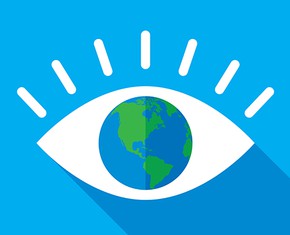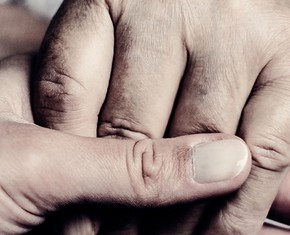The views expressed in our content reflect individual perspectives and do not represent the authoritative views of the Baha'i Faith.
When you take on an identity, you draw borders around yourself. Those borders can be wide and expansive or narrow and limiting. So beware of the potential pitfalls of identity — they can put you in a cage.
No one wants to be caged, which means that constructing a personal identity should always attempt, at all costs, to avoid the constricting barriers of any self-imprisoning limits.
Unfortunately, elements of our culture seem to be moving in the opposite direction lately.
RELATED: “You Aren’t Lazy – You Just Need to Slow Down”
The Traps of Assigned Identities
Constricting identities abound. Many people have apparently decided to limit how they define themselves with just a single identifying factor: their nationality, their demographics, their skin color, their educational levels, their religion or lack of one, their work, their political ideology, their economic class, their gender, or their identification with an oppressed group.
Assigned identities like these, often based primarily on accidents of birth, can become traps.
The Stanford Encyclopedia of Philosophy suggests how those kinds of singular, limiting identities can trap us:
To the extent that identity politics urges mobilization around a single axis, it will put pressure on participants to identify that axis as their defining feature, when in fact they may well understand themselves as integrated selves who cannot be represented so selectively or reductively.
In that passage, the phrase “integrated selves” plays a central role. Having an integrated self — normally defined in psychology as a fully functioning person with unity of thought, emotion, and action — means being healthy, balanced, and authentic. As the poet Walt Whitman said about the integrated self, “I am large, I contain multitudes.” When we’re able to internally reconcile and balance the multitudes we contain, we have made progress toward an integrated self and an all-encompassing human identity.
The Stanford Encyclopedia of Philosophy also points out that when we refuse to define ourselves by only one aspect of our lives, we broaden our perspective and our role in human progress:
Generalizations made about particular social groups in the context of identity politics may also come to have a disciplinary function within the group, not just describing but also dictating the self-understanding that its members should have.
So who are we? As fully integrated selves, we can better understand our true reality by meditating on this passage from a speech Abdu’l-Baha gave in Paris in 1911:
The reality of man is his thought, not his material body. The thought force and the animal force are partners. Although man is part of the animal creation, he possesses a power of thought superior to all other created beings.
If a man’s thought is constantly aspiring towards heavenly subjects then does he become saintly; if on the other hand his thought does not soar, but is directed downwards to centre itself upon the things of this world, he grows more and more material until he arrives at a state little better than that of a mere animal.
We each have a spiritual reality, the Baha’i teachings assert. Our bodies last a relatively short time, but our souls are eternal. Our identities, then, must recognize that essential fact and act on it. That is our largest overriding identity — we all are members of the human family, and each one of us has a soul. We’re spiritual beings because our souls represent our most essential and most permanent reality.
How to Transcend Your Assigned Identity
I am a white male American of Scandinavian heritage. I have a college education. I live in California. These facts alone could potentially construct and constrict my identity unless I decided to escape the constraints of a limiting, self-defined reality by adopting and fostering a wider and more universal one.
Personally, that’s a major reason why I became a Baha’i — because I wanted to transcend those narrow definitions of who I am. I wanted, by declaring my belief in Baha’u’llah, to become a global citizen, a member without borders or boundaries of the entire human race, a person who defines himself as one who accepts, values, and loves all human identities. I wanted to transcend the limitations of prejudice, of patriotism, of patrimony. I wanted to proclaim, inhabit, and live into my connection to all humankind, not just some artificially circumscribed subset of us.
This single passage from Baha’u’llah’s writings convinced me that I needed to strive to make my identity as large and expansive as it could possibly be:
O contending peoples and kindreds of the earth! Set your faces towards unity, and let the radiance of its light shine upon you. Gather ye together, and for the sake of God resolve to root out whatever is the source of contention amongst you. Then will the effulgence of the world’s great Luminary envelop the whole earth, and its inhabitants become the citizens of one city, and the occupants of one and the same throne.
Perhaps that’s why I was so moved by my friend Masud Olufani’s Facebook post a while back.
Masud, an African American Baha’i and a talented artist, actor, and writer (who has written often here at BahaiTeachings.org), recently returned from Africa, where he visited many of the sites related to the Atlantic slave trade. In Sierra Leone, he stood in the dungeons at Elmina and Cape Coast Castle, where captured Africans were loaded onto slave ships. These places bear silent witness to the great injustices of colonialism, imperialism, genocide, and human oppression. In the Mende village of Moyamba, Masud received his new Mende name — Mahungbay Mbomeh, which means “take care of it,” as in “to fulfill your commitments.”
RELATED: Don’t Take Anything Personally: 5 Tips for the Second Agreement
When I asked Masud what that meant to him in terms of his own reality and self-identity, he told me that his African name helped him:
… distinguish the unique experience of African Americans being marginalized by skin color and that marginalization being an imposed reality codified in law. Africans refer to themselves by tribal affiliation not color; Ashante, Mandinka, Fulani, Akan etc. The superficial preoccupation with color was an innovation of the slave system. The consequence of color within the context of African Americans is an inescapable reality, “stamped from the beginning” as Ibram X. Kendi articulates in his book of the same name. The racist system therefore imposes a reality that centers color — not the animating force of the spirit. Black folk must wrestle with that reality even as we seek to be fully embraced as spiritual beings first.
After he returned from Africa, Masud publicly posted this brief but profound message:
I celebrate and lift up the beauty and power of my Blackness while at the same time embracing the deep, embodied realization that my primary identity is spiritual and it is that reality that makes me kin to every human being on earth.
He accompanied that moving message with this quotation from Abdu’l-Baha’s book Some Answered Questions:
… the human body, all the members of which are connected and linked with one another with the greatest strength. How much the organs, the members and the parts of the body of man are intermingled and connected for mutual aid and help, and how much they influence one another!
That courageous, transcendent approach to our primary identity as spiritual beings struck a powerful chord for me and reminded me why I’m a Baha’i.
You May Also Like
Comments

















important to figure out "Who am I".
Your comments and references are valuable--Thank you!
Therefore I Am"
But is The "Who" I Am
Dictated by
My Understanding of,
My Acceptance of,
The "Who"
I wish to Be!
&
The "Who"
I wish others to perceive as Me!
Are These "Who's" The
* Same Persona?
Not necessarily!
* Compatible Persona?
Not necessarily!
* Mutually Exclusive Persona?
Not necessarily!
Meditate thoughtfully and purposefully on the wisdom of this passage from a speech Abu'l-Baha gave in ...Paris in 1911.
drhiguera